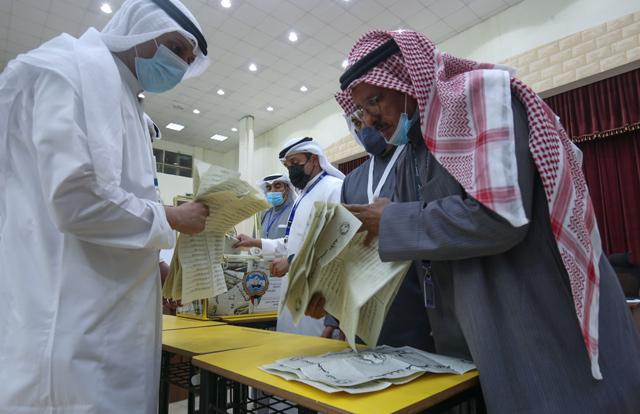You are here
Kuwait opposition makes strong gains in parliamentary elections
By AFP - Dec 06,2020 - Last updated at Dec 06,2020

A Kuwaiti judge (right) and his aides count the ballots at a polling station at the end of the parliamentary elections vote, in the Abdullah Al Salem district of Kuwait city, on Saturday (AFP photo)
KUWAIT CITY — Kuwait's opposition took nearly half of parliament's seats in weekend polls amid calls for reforms over corruption and high debt, but the sole female lawmaker lost her seat.
Twenty-four of the national assembly's 50 seats were won by candidates belonging to or leaning towards the opposition, up from 16 in the last parliament, according to results announced on Sunday.
But while 29 women ran for office in Saturday's race, none were elected — a blow to the status of women who have fought hard over recent years for more representation in the oil-rich emirate, after winning the right to vote just 15 years ago.
Nevertheless, the election of 30 candidates under the age of 45 sent out a promising signal to youth hoping for change and reform.
The election, which takes place every four years, was overshadowed by COVID-19 and a consequent paring back of campaigns that in normal times draw thousands for lavish banquets and over-the-top events.
Five polling stations — one in each electoral district — were specially fitted out to allow citizens infected with coronavirus to cast their votes.
The polls were the first since the new emir, Sheikh Nawaf Al Ahmad Al Sabah, took office in September following the death of his half-brother, Sheikh Sabah Al Ahmad Al Sabah, at the age of 91.
The country has the Gulf’s oldest elected parliament, but under the constitution the emir has extensive powers and can dissolve the legislature at the recommendation of the government.
‘Big change’
Thirty-one new faces will enter the new parliament, results showed.
The Muslim Brotherhood-linked Islamic Constitutional Movement won three seats, while candidates from the Shiite minority population won six.
“There is a big change in the composition of the new national assembly,” Kuwait analyst Ayed Al Manaa told AFP.
“This is an indication of the voters’ anger over the performance of the previous parliament and of their desire for change in economic, health, education” and services, he said.
Like most Gulf countries, Kuwait’s economy and state budgets have been slammed by the double whammy of the pandemic and the depressed price of oil, with the International Monetary Fund expecting the economy to shrink by about 8 per cent this year.
Officials in the country, where foreigners make up 70 per cent of the 4.8 million population, have already said they want to slash that proportion to 30 per cent of the total population.
Lulwa Saleh Al Mulla, head of the Kuwaiti Women’s Cultural and Social Society, said she was hopeful about the new younger members in parliament, but disappointed by the lack of women’s representation.
“Still, the people participated positively in the polls for change and toppled some of the corrupt elements that distorted the image of democracy and abused their positions in the assembly,” she said.
‘Instability’
Political parties are banned in Kuwait, which has been ruled by the Al Sabah family for two-and-a-half centuries. The country adopted a parliamentary system in 1962.
Many groups operate freely as de facto parties. The opposition coalition is made up of individuals, rather than well-defined parties with a distinct ideology.
“Results have largely reflected my expectations: Many opposition voices — especially of the more restive/conservative constituencies... won at the expense of status quo, liberals and women,” tweeted Cinzia Bianco, a research fellow at the European Council on Foreign Relations.
“Uphill battle for the Kuwait government, expect some instability,” she added.
As per protocol, the Cabinet resigned on Sunday and the first parliamentary session is set to take place on December 15.
Related Articles
KUWAIT CITY — The Kuwaiti Cabinet on Monday submitted its resignation to the emir of the oil-rich Gulf state following snap parliamentary po
KUWAIT CITY — Kuwait's Cabinet tendered their resignation Tuesday only a month after the government was formed amid arguments with parliamen
KUWAIT CITY — Kuwait’s fifth government in less than one year took the oath of office on Monday after elections returned an opposition-contr
















